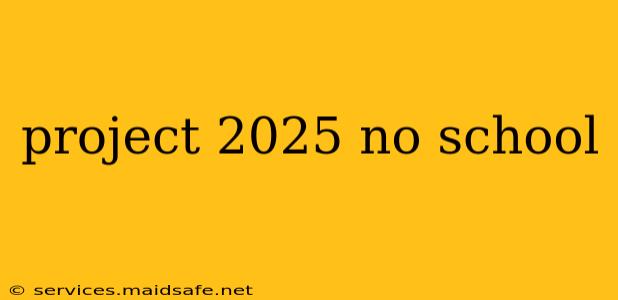The year is 2025. The traditional school bell rings for the last time… or does it? The concept of "no school" in 2025 isn't about abandoning education entirely, but rather a radical reimagining of how and where learning takes place. Project 2025, a hypothetical exploration of future education, prompts us to consider several key questions: What will learning look like? Will technology replace teachers? And what role will schools play in this new landscape?
The Changing Face of Education in 2025
Project 2025 envisions a future where personalized learning reigns supreme. Forget rigid curriculums and standardized testing. Instead, imagine a world where:
- Personalized Learning Paths: Students follow customized learning journeys, tailored to their individual strengths, weaknesses, and interests. AI-powered platforms assess learning styles and create dynamic curricula, adapting in real-time to each student's progress.
- Experiential Learning: Rote memorization is replaced with hands-on, project-based learning. Students actively engage with the world around them, conducting research, collaborating on projects, and solving real-world problems. Think field trips that extend for weeks, internships integrated into the curriculum, and community-based initiatives.
- Blended Learning Environments: The classroom transcends physical walls. Students can access educational resources online anytime, anywhere, through virtual reality experiences and interactive simulations. This blended approach allows for flexible learning, catering to diverse needs and learning styles.
The Role of Technology in Project 2025
Technology isn't just a tool; it's a transformative force in Project 2025. AI tutors offer personalized support, while virtual reality simulations create immersive learning environments. However, it's crucial to remember:
- Technology as a facilitator, not a replacement: While technology enhances learning, human interaction remains essential. Teachers act as mentors, guides, and collaborators, fostering critical thinking and emotional intelligence.
- Addressing the digital divide: Equitable access to technology and digital literacy training is paramount to ensure all students benefit from the advancements in education.
Beyond the Classroom: Redefining "School"
In Project 2025, the concept of "school" undergoes a significant transformation. Physical schools might still exist, but their role evolves into:
- Collaboration hubs: Schools become vibrant centers for collaborative learning, offering workshops, mentorship programs, and shared resources.
- Community centers: Schools open their doors to the wider community, offering learning opportunities for all ages and backgrounds.
- Innovation labs: Schools become incubators for innovation, equipping students with the skills and resources to tackle real-world challenges.
Challenges and Opportunities of Project 2025
Project 2025, while promising, also presents challenges:
- Teacher training and adaptation: Educators will need ongoing professional development to effectively utilize new technologies and personalized learning strategies.
- Data privacy and security: Protecting student data in a technology-driven environment is crucial.
- Equity and access: Ensuring equitable access to resources and technology remains a persistent challenge.
However, the opportunities are equally significant:
- Increased student engagement and motivation: Personalized learning caters to individual needs and interests, fostering greater engagement and motivation.
- Development of 21st-century skills: Project 2025 equips students with critical thinking, problem-solving, and collaboration skills essential for success in a rapidly changing world.
- A more inclusive and equitable education system: Personalized learning has the potential to address learning differences and create a more inclusive learning environment.
Project 2025 is not just a futuristic vision; it's a call to action. By embracing innovation and addressing the challenges, we can pave the way for a future where education is truly personalized, engaging, and accessible for all.

